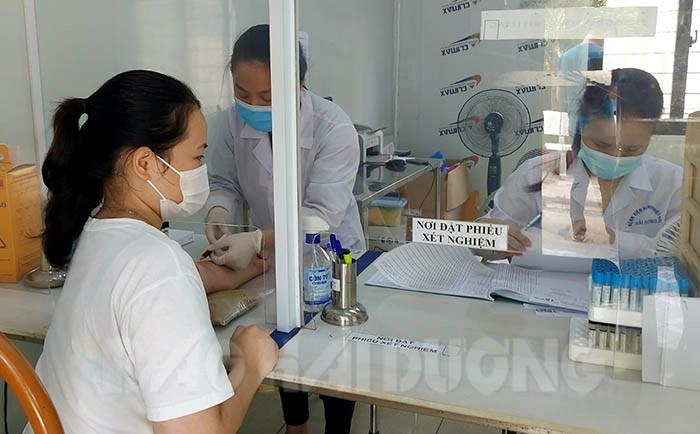July 28th is World Hepatitis Day. Vaccination, regular health check-ups, and early detection will help control the disease and avoid complications such as cirrhosis and liver cancer.

Ms. Bui Khanh L. takes regular blood samples for testing to control hepatitis virus load.
The Provincial Hospital for Tropical Diseases is managing over 1,400 patients with viral hepatitis, most of whom are hepatitis B and C. On average, more than 50 people come for examination and treatment every day. The hospital has invested in many modern equipment for testing, ultrasound, identifying hepatitis, cirrhosis, liver cancer, etc.
Dr. Nguyen Van Tho (Provincial Hospital for Tropical Diseases) said that Vietnam is one of the countries with a high prevalence of hepatitis, especially viral hepatitis B. It is estimated that the national rate is 15-20% of the population infected with the hepatitis B virus. Currently, Hai Duong has 3 units managing and treating viral hepatitis: the Tropical Diseases Hospital, the Provincial General Hospital and the Hai Duong Medical Technical University Hospital with about 3,600 patients. The number of people with viral hepatitis being managed is still small compared to the number of people infected in reality.
There are 5 main types of hepatitis viruses, including A, B, C, D and E. These viruses cause disease in all ages, regardless of gender, and have unlimited transmission. Of these 5 types of hepatitis viruses, hepatitis B and C viruses have the greatest impact on human health. If hepatitis B and C viruses are not detected early, they will be one of the leading causes of cirrhosis and liver cancer.
However, this disease can be completely controlled if detected early and treated promptly. Ms. Bui Khanh L., 24 years old, in Thanh Lang commune (Thanh Ha) was detected and treated early for viral hepatitis. Because her family had someone with hepatitis B, in 2019, Ms. L. proactively went for a check-up and detected the disease at an early stage, so she did not have cirrhosis. Regularly taking medication has controlled the hepatitis virus load below the threshold. On July 21, Ms. L. came for a periodic check-up with good health, no enlarged liver and spleen... With this result, she plans to have children in the next stage. With good control of Ms. L.'s hepatitis virus load after 3 consecutive times according to regulations, she can temporarily stop taking medication and monitor her health in the coming time.
Viral hepatitis B and C progress silently, so patients often ignore the symptoms. When arriving at a medical facility, patients often have symptoms that affect their health such as fatigue, bitter mouth, full stomach, loss of appetite, poor sleep... At this point, the patient has developed dangerous complications that progress to cirrhosis and even liver cancer. Doctor Tho advises people to have regular health check-ups, especially those at high risk such as those with chronic immunodeficiency, families with hepatitis B and C, pregnant women, people with HIV, unsafe sex, sharing needles... All newborns must be vaccinated against hepatitis B within 24 hours of birth. For those with symptoms of fatigue, loss of appetite, abdominal pain, yellow urine, yellow skin and eyes, they need to go to a medical facility early for examination, timely detection and treatment of the disease.
DUC THANH